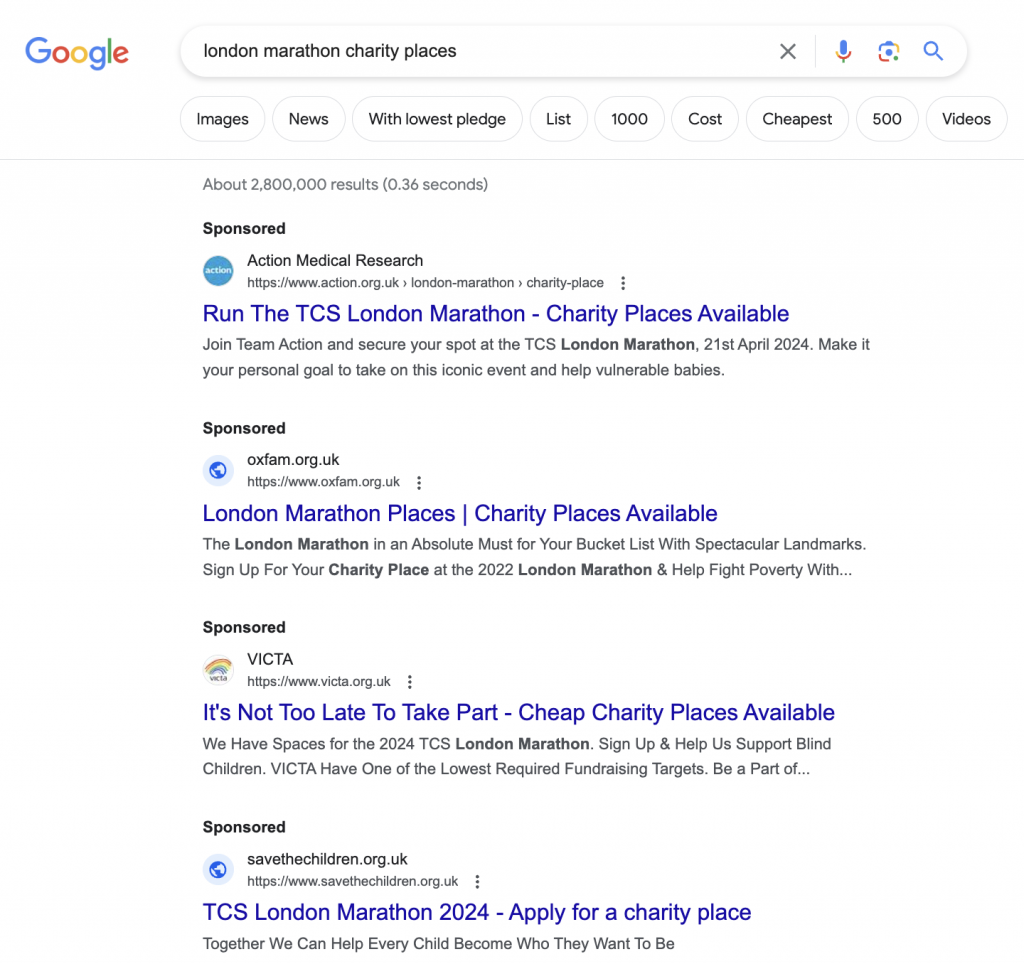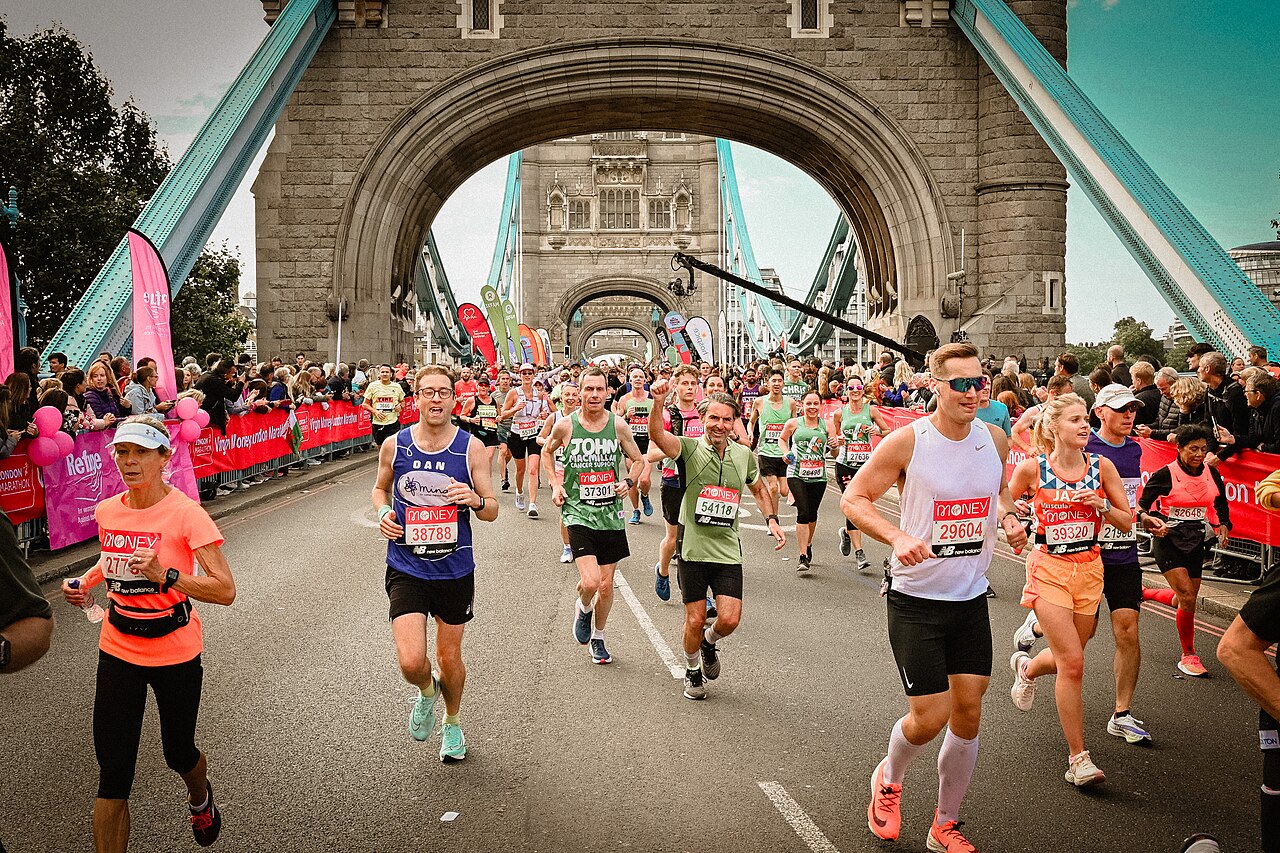I’ve provided SEO support to tonnes of charities over the years and without a doubt the most common topic of conversation is about how they can drive more traffic to their fundraising pages.
And it’s completely understandable why. They are transactional pages so they have high high profitability, it makes logical sense to try to drive as many users to them.
Many fundraising teams also have internal objectives to increase sign ups to their events so they naturally enquire with their SEO agency/consultant about what can be done.
But these pages are quite unusual and ultimately a perfect storm of frustration for your SEO consultant.
So what is the problem?
Every Charity Has the Same Pages
The very biggest issue with fundraising pages is that there are thousands of completely identical offerings from every other charity across the UK.
Almost every charity has a London Marathon page, for example. Google “London Marathon Charity Places” and just keep scrolling, the list of relevant charity pages for this search term is never ending. And of course, since these pages are so profitable, many charities will spend money on Google ads so that they appear even before the organic results.

And all of the pages are more-or-less the same. Most of them cover elements such as the minimum sponsorship, why run for the cause, the charity cheer point, the post-race reception, the race route etc.
As a product offering, this is highly unusual.
Normally if you are looking to buy a product or service there will be lots of options all with slight differences and with different sellers. In the case of fundraising pages, we’ve got the exact same product being sold with the only difference being who is selling it.
Imagine if you wanted to buy a new lamp. You search Google and every single result is for the exact same lamp at the exact same price, the only difference is the vendor.
And in the case of charities, every “seller” is amazing so the cause isn’t even that much of a USP.
So that’s the first issue. What do you do when you don’t have anything that can help you stand out?
Do Optimise Your Fundraising Pages
To be clear, when I talk about fundraising pages I’m talking about everything from challenge events to coffee mornings. We’re talking about the types of fundraisers that people search for generically, without having a charity already in mind. For example:
- Charity bake sale
- Great North Run charity places
- RideLondon 100 charity places
- Charity swims
- Carol singing for charity
- Charity quiz nights
- Sponsored walk for charity
etc.
You may have some of all of these types of pages on your site already, and there are hundreds more that you could add. It’s not to say that you shouldn’t bother optimising them (you should), it’s just that you might want to set your expectations a little more modestly for how likely they are to perform.
There is a chance they could rank well, especially if you’re on of the biggest charities in the UK, but more often than not it turns out to be identical to 500 other charity pages on the same topic.
Still, the number 1 reason we optimise is for user experience – organic search comes 2nd.
As such, make sure every single page is as comprehensive as possible about the event, the cause they’re raising money for, what your fundraising team can offer, how to get started, fundraising materials, how they can pay in their money, and absolutely anything else you can think of.
Go through the top 10 ranking pages and start to look at what elements they have. If we go back to the London Marathon as an example, we can see they include features such as:
- Event details
- Minimum fundraising
- Route
- Registration fee
- How the application process works
- How to join with your own place
- How your money will be spent
- How to get in touch for more information
- Testimonials
- Videos from previous years events
- FAQs
- What happens if you don’t reach the minimum sponsorship amount
The list goes on.
By making your page comprehensive and answering everything a user needs to know, those who find it by other means (i.e. navigating through the site, social media, email etc.) are much more likely to convert.
And when you focus solely on user experience, search engines reward that (and so does AI).
Keep the Same URL Live
For many events, the page is updated yearly to reflect whether applications are open and which year it’s referring to. One of the biggest mistakes to make is to create a new URL every year (i.e. /london-marathon-2026/ instead of a generic /london-marathon/, and to unpublish it once the event has passed.
Search engines reward consistency. If your page resolves in a 404 error for half the year and then is live for the other half, it’s not a great look. Pages that are live for a long period of time are favoured by search engines as they can be pretty sure they can send users there and it’s not at risk of being taken down any soon – why would it when it’s been live for so long?
Additionally, the external links that point to your page (backlinks) are a ranking factor and these can be kept year on year if you keep the URL live. Once external websites see that there are links on their website going to a 404 page, they’ll very often remove them and that’s a huge loss.
Adding a 301 redirect each year to the new page can save those backlinks, but it’s not as ideal as having that URL consistency year after year.
Write Related Informational Content
One great way to grow your visibility is to write informational content related to the action you’re asking people to take. These are the types of tips, guides, and resources that help users to prepare for the event or to reach their fundraising goals.
By creating an ecosystem of relevant content that naturally links to one another, you’re creating a comprehensive user experience that search engines love.
Consider writing content such as:
- Training guides
- Fundraising ideas
- Tips for the big day
- How to cheer on family and friends
- How to talk about the cause to donors
etc.
Make sure that each article clearly links back to your transactional page.
Write Informational Content About Your Cause
Whether you’re trying to generate interest in your fundraising offerings or a different action entirely, writing content about your cause is always an impactful strategy for your website.
For example, if you are a charity for a medical condition, your informational content will cover everything about the symptoms, causes, prevention, treatment, and diagnosis of that condition as a minimum. You can cover all sorts of other topics within that realm too, everything from guidance for carers to what to expect in the hospital.
If you’re an international organisation, you would naturally talk about the issues you deal with in each country you work in. For example, poverty in Bangladesh, or child labour in India etc.
You should aim to create a “topic universe” where you brainstorm every possible topic you could cover on the site that is relevant to what you do as an organisation. An SEO consultant can help you do this in a structured way, validated with keyword research. However, you can also do it yourself or with your team, with a little bit of preparation.
Again, the number one reason for creating this content is user experience. It educates your audience about the issues you deal with and encourages them to learn more about what you do.
However, the number two reason for this content is to generate organic traffic from users searching for this information, who you can then make aware of the actions you would like them to take.
Relate the content back to the work that you do (i.e. “see the amazing work we do about this issue”). Sometimes you can do this naturally within the content when it’s particularly pertinent to your cause. Other times you can use a section at the end of the article to more explicitly explain how it relates back to what you do, ensuring to link to relevant What We Do type pages.
Those simple steps bring users on a journey of:
- Learning about the issue
- Learning who you are and what you do about the issue
The third step is to make them aware of the actions you want them to take. This may change regularly, but it’s the point at which they are most likely to convert.
Make sure your What We Do pages contain a call to action i.e. “Donate to our … appeal” or “Run the London Marathon for us”. You can change these out as often as you like depending on which action is a priority at the time.
This brings users towards the bottom of the user funnel – taking an action.
Focus on the Less Saturated Asks
You will likely have asks on your website that are more unique to what you do as an organisation and less competitive than generic fundraising pages.
“Donate to girls education in Sierra Leone” is much more niche than “Run the London marathon for charity”, for example. There will be much fewer organisations competing for these types of keywords and so it may be worth putting more effort into those pages.
They are also likely to be much more relevant to your cause so you could include CTAs to them directly from your informational content instead of having to go through What We Do pages first.
Final Thoughts
Some organisations look to procure SEO services solely to optimise their fundraising event pages, and as a result there is a high chance of disappointment when the agency or consultant can’t deliver.
The strategies I’ve written about are some of the best ways to approach the troublesome situation of generic fundraising pages but they’re by no means quick wins or easy to show a positive ROI for. They require much more long-term thinking, resource and strategic vision. And if senior stakeholders are keen to see quick results, it may be that Google ads or display ads are a better option.
Photo credit: DanHuddleston





